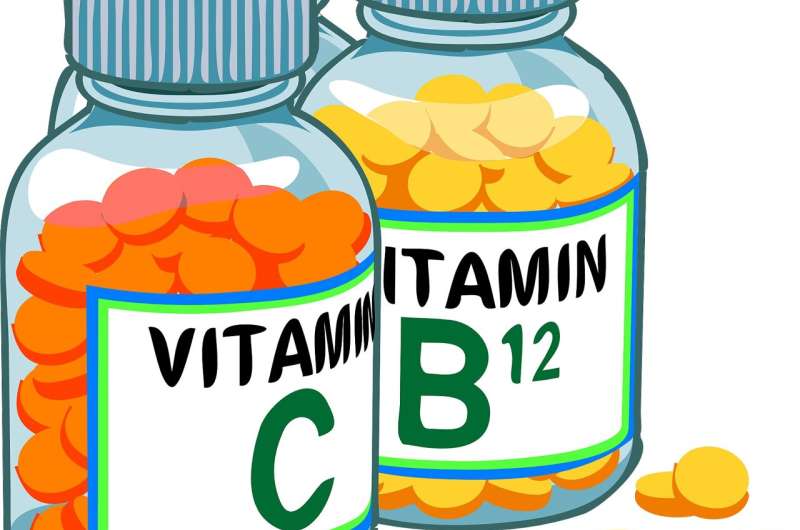Drawn to the allure of multivitamins and dietary supplements filling nutritional gaps in their diet, people in the U.S. in 2021 spent close to $50 billion on vitamins and dietary supplements.
But Northwestern Medicine scientists say for non-pregnant, otherwise healthy Americans, vitamins are a waste of money because there isn't enough evidence they help prevent cardiovascular disease or cancer.
"Patients ask all the time, 'What supplements should I be taking?' They're wasting money and focus thinking there has to be a magic set of pills that will keep them healthy when we should all be following the evidence-based practices of eating healthy and exercising," said Dr. Jeffrey Linder, chief of general internal medicine in the department of medicine at Northwestern University Feinberg School of Medicine.
Linder and fellow Northwestern Medicine scientists wrote an editorial that will be published June 21 in JAMA that supports new recommendations from the United States Preventive Services Task Force (USPSTF), an independent panel of national experts that frequently makes evidence-based recommendations about clinical preventive services.
Based on a systematic review of 84 studies, the USPSTF's new guidelines state there was "insufficient evidence" that taking multivitamins, paired supplements or single supplements can help prevent cardiovascular disease and cancer in otherwise healthy, non-pregnant adults.
"The task force is not saying 'don't take multivitamins,' but there's this idea that if these were really good for you, we'd know by now," Linder said.
The task force is specifically recommending against taking beta-carotene supplements because of a possible increased risk of lung cancer, and is recommending against taking vitamin E supplements because it has no net benefit in reducing mortality, cardiovascular disease or cancer.
"The harm is that talking with patients about supplements during the very limited time we get to see them, we're missing out on counseling about how to really reduce cardiovascular risks, like through exercise or smoking cessation," Linder said.
More than half of Americans take vitamins. Why?
More than half of U.S. adults take dietary supplements, and use of supplements is projected to increase, Linder and his colleagues wrote in the JAMA editorial.
Eating fruits and vegetables is associated with decreased cardiovascular disease and cancer risk, they said, so it is reasonable to think key vitamins and minerals could be extracted from fruits and vegetables, packaged into a pill, and save people the trouble and expense of maintaining a balanced diet.
But, they explain, whole fruits and vegetables contain a mixture of vitamins, phytochemicals, fiber and other nutrients that probably act synergistically to deliver health benefits. Micronutrients in isolation may act differently in the body than when naturally packaged with a host of other dietary components.
Linder noted individuals who have a vitamin deficiency can still benefit from taking dietary supplements, such as calcium and vitamin D, which have been shown to prevent fractures and maybe falls in older adults.
New guidelines do not apply to pregnant people
The new USPSTF guidelines do not apply to people who are pregnant or trying to get pregnant, said JAMA editorial co-author Dr. Natalie Cameron, an instructor of general internal medicine at Feinberg.
"Pregnant individuals should keep in mind that these guidelines don't apply to them," said Cameron, who also is a Northwestern Medicine physician.
"Certain vitamins, such as folic acid, are essential for pregnant women to support healthy fetal development. The most common way to meet these needs is to take a prenatal vitamin. More data is needed to understand how specific vitamin supplementation may modify risk of adverse pregnancy outcomes and cardiovascular complications during pregnancy."
Additionally, recent research from Northwestern has found most women in the U.S. have poor heart health prior to becoming pregnant. Cameron said that, in addition to discussing vitamin supplementation, working with patients to optimize cardiovascular health prior to pregnancy is an important component of prenatal care.
Eating healthy, exercising is 'easier said than done'
Dr. Jenny Jia, a co-author of the JAMA editorial who studies the prevention of chronic diseases in low-income families through lifestyle interventions, said healthy eating can be a challenge when the U.S. industrialized food system does not prioritize health.
"To adopt a healthy diet and exercise more, that's easier said than done, especially among lower-income Americans," said Jia, an instructor of general internal medicine at Feinberg and a Northwestern Medicine physician. "Healthy food is expensive, and people don't always have the means to find environments to exercise—maybe it's unsafe outdoors or they can't afford a facility. So, what can we do to try to make it easier and help support healthier decisions?"
Over the past few years, Jia has been working with charitable food pantries and banks that supply free groceries to people who are in need to try to help clients pick healthier choices from the food pantries as well as educate those who donate to provide healthier options or money.





Recommended Comments
Join the conversation
You can post now and register later. If you have an account, sign in now to post with your account.
Note: Your post will require moderator approval before it will be visible.